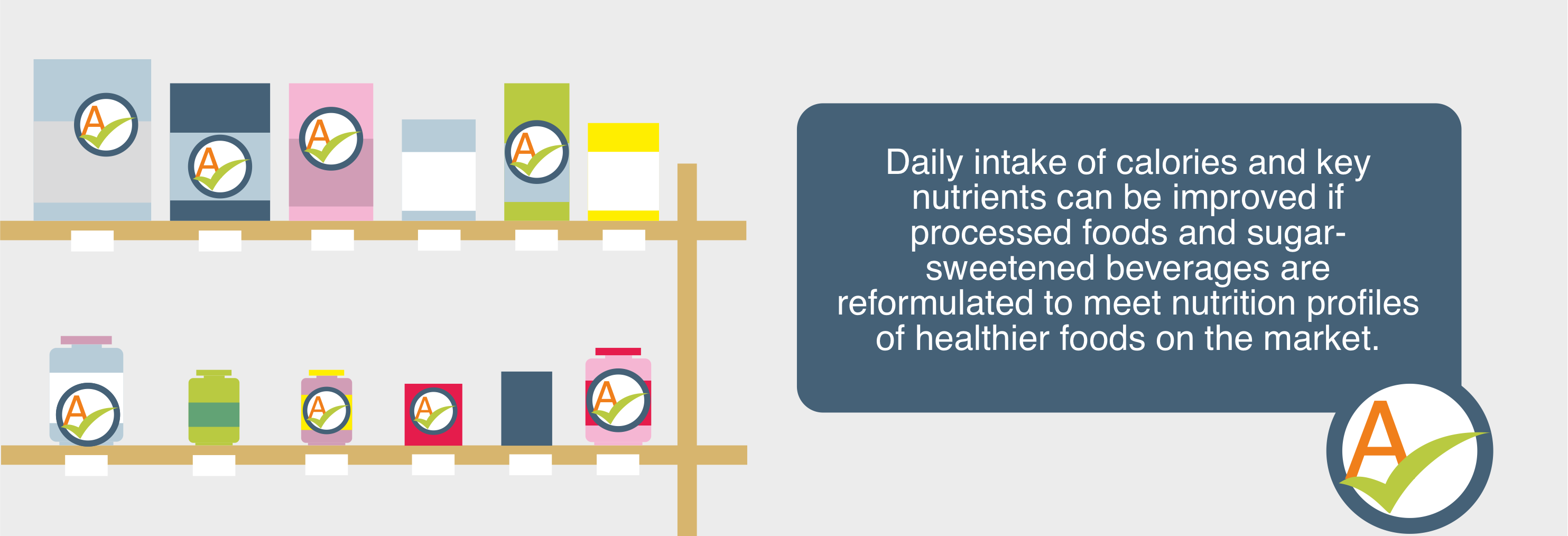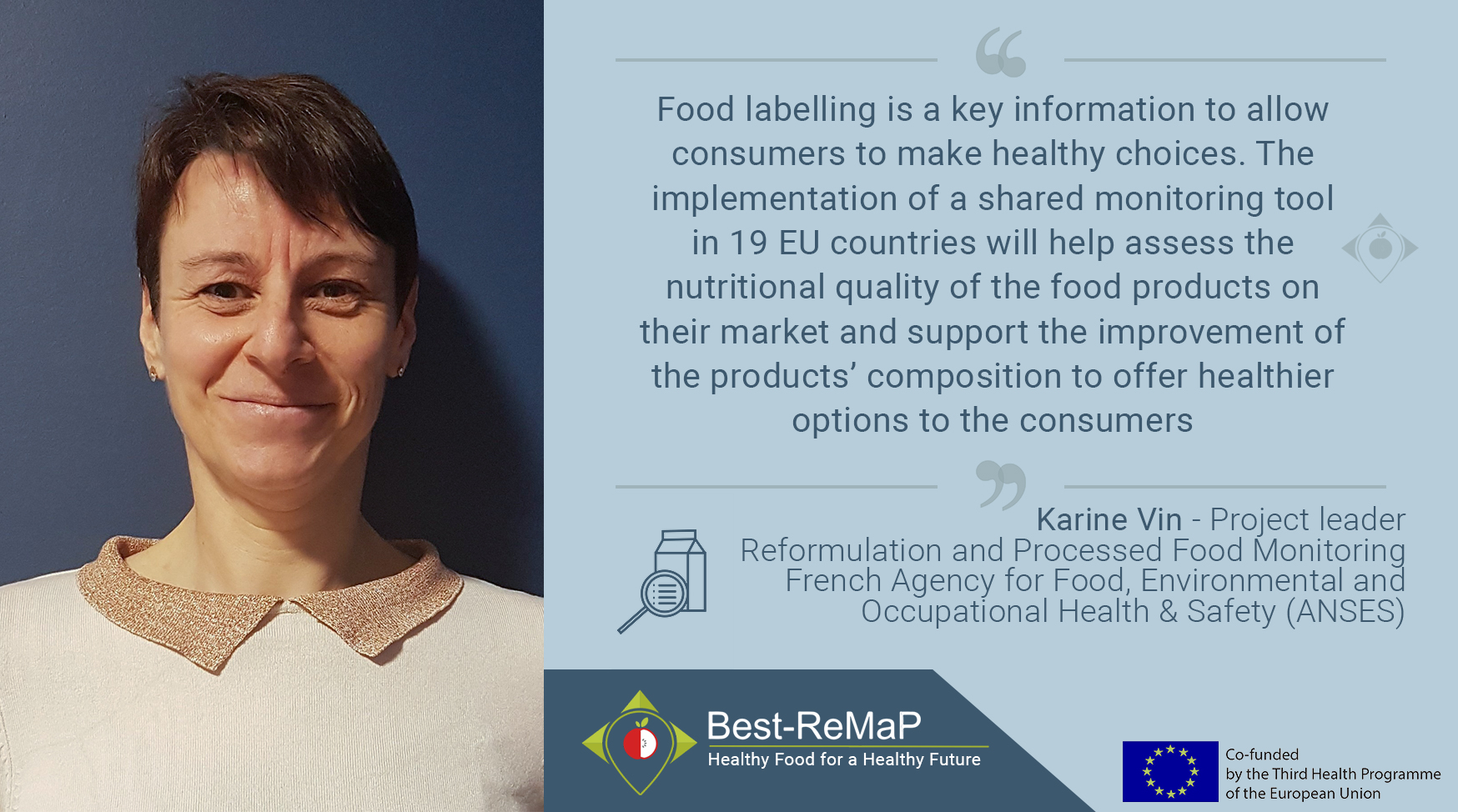
Processed Food Monitoring and Reformulation
Work Package 5
What we eat has an enormous impact on our health. Activities aimed at re-designing food products into healthier alternatives (so-called food reformulation) are among the key strategies in improving diet in children. Monitoring the processed food supply at brand level serves as a basis for reformulation interventions. However, currently only a few European countries are able to do that.
Our vision
Increasing the offer of healthier options of processed foods in EU supermarkets has the potential to improve population diet and can lead to measureable health benefits.
Our goals
- to share and promote best practices on how to implement a sustainable European monitoring system for processed food reformulation;
- to provide data for identifying best formulations and room for reformulation;
- to provide data to establish, evaluate and adapt nutrition policies.

What is food reformulation?
Food reformulation is defined as the process of altering a food or beverage product’s recipe or composition with the objective of making it healthier. The concept of food reformulation was initially based on targeting specific food ingredients, which are considered harmful for human health such as sugar, salt and saturated fat. Read more
The Oqali model
The Oqali project has been set up in 2008 by the ministries in charge of agriculture, health and consumption with the aims of monitoring changes in the processed food supply available on the French market by measuring nutritional quality evolution over time (nutritional composition and food label information). Oqali builds on several labelling indicators such as health claims, nutritional claims, serving size and nutrient content. Read more
The JANPA joint action
The JANPA Joint Action (2015-2017) implemented a pilot study in 2 EU countries to test the Oqali model at European level. It has demonstrated that Oqali can be easily deployed in Europe.
The EUREMO study
The EUREMO study (2019-2022) is funded by the European Commission and running in 15 EU Member States. EUREMO has two main tasks: 1) to deliver an interoperable dataset of nutritional information on processed food; and 2) to organize workshops and twinning actions, as well as to provide technical support for the participating countries.
Our knowledge-base

The objective of this paper is to give a detailed analysis of the monitoring of the ready-to-eat breakfast cereals sector in order to show the benefits of the Oqali database. Results showed a large variability in nutrient content throughout the sector, both within and between product categories. Read more

The first aim of Oqali is to develop indicators on nutritional variability and on the quantity and quality of labelling parameters, by food sector and possibly by type of brands. These indicators could be weighted by market shares, so as to reflect the nutritional impact of the most frequently sold processed foods. The second aim is to follow up trends and possible changes over time. Read more

This study aimed to quantify the contribution of food reformulation to changes in the nutritional quality of consumers’ food purchases, and compare it with the impact of substitutions made by consumers. Product reformulation initiatives have improved existing products for most food group-nutrient pairs. In particular, the contribution of food reformulation to the change in nutritional quality of food purchases was strong in potato chips and breakfast cereals. Consumers’ substitutions between food items were not generally associated to an improvement in the nutritional quality of the food purchases. Policies aiming to promote food reformulation may have greater impact than those promoting changes in consumer behavior. Read more

Nutritional composition and health claims on the 1646 most consumed dairy products in France were analyzed. Nutrient contents of the cheaper brands of dairy products did not vary systematically from more expensive ones. However, national brands and retailer brands products provided more nutrition information on labels than the cheaper ones. Read more

16,081 products from 24 food groups were assessed between 2008 and 2011 based on the nutritional data provided on the labels of processed foods (nutritional information and composition), at the branded level, in order to monitor changes in food composition (including reformulation) and nutritional labelling over time. Read more
What will Best-ReMaP do?
Develop guidelines on processed food supply and reformulation monitoring
Selection of five processed food categories to be monitored by assessing the contribution of different food groups to nutrient intakes (fat, saturated fat, sugars, salt), especially among children. Improving efficiency and sustainability of monitoring efforts by exploring new sources of data (crowdsourcing, open databases, GS1) and new technologies. (Food group prioritization is foreseen in June 2021).
Develop technical guidelines for monitoring the processed food supply and reformulation. (Guidelines are foreseen in June 2021 for the first draft and March 2023 for the finalized version).
Launch a European branded food database
Set up a sustainable European system to facilitate and monitor processed food reformulation. The database will allow comparisons and encourage the improvement of nutritional quality in the European food supply, and will be hosted by the EC Joint Research Center. (Open European database is foreseen in March 2023).
Implement snapshots of available food products
Based on the Oqali methodology, collection and standardization of the nutritional information (i.e. composition, ingredients and portion size) of processed foods, provided on food labels with the European Regulation N°1169/2011 (proteins, carbohydrates, salt, sugars, fats, saturated fats and energy). Production of statistics in order to have a first overview of the food supply in each participating country. (Report is foreseen in November 2022).
At another time and using the same methodology, collection of nutritional data provided on food labels of processed foods and analyze trends by comparing data with the first snapshot. (Full report is foreseen in August 2023).
Promote food reformulation
Assessment of the nutritional quality evolutions and identification of best reformulation practices. Assessment of the impact of processed food reformulation on nutrient intakes by using the nutritional composition data available with a focus made on children. European comparisons of the processed food reformulations and processed food turnover. (Report D5.4 is foreseen in September 2023)


The content of this website represents the views of the author only and is his/her sole responsibility; it cannot be considered to reflect the views of the European Commission and/or the European Health and Digital Executive Agency (HaDEA) or any other body of the European Union. The European Commission and the Agency do not accept any responsibility for use that may be made of the information it contains.

